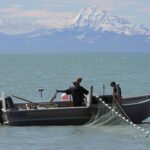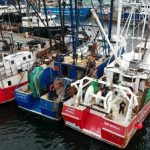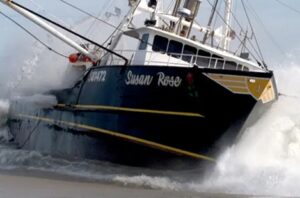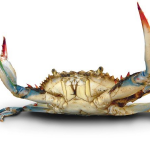Tag Archives: scallops
‘I’m happy it’s back on:’ Scallop fishing resumes along Northern Gulf of Maine
 Scallop fishing is back after a brief pause. On April 11, the National Oceanic and Atmospheric Administration paused scallop fishing along the Northern Gulf of Maine because regulators had not finalized catch limits for fishermen. The Northern Gulf of Maine regional area runs from Boston all the way to the Canadian border. The pause ended on Monday morning after the annual quota was decided at around 675,000 pounds. Togue Brawn, owner of Down East Day Boat, says these regulations are critical in preventing overharvesting. Video, Photos, more, >>CLICK TO READ<< 06:45
Scallop fishing is back after a brief pause. On April 11, the National Oceanic and Atmospheric Administration paused scallop fishing along the Northern Gulf of Maine because regulators had not finalized catch limits for fishermen. The Northern Gulf of Maine regional area runs from Boston all the way to the Canadian border. The pause ended on Monday morning after the annual quota was decided at around 675,000 pounds. Togue Brawn, owner of Down East Day Boat, says these regulations are critical in preventing overharvesting. Video, Photos, more, >>CLICK TO READ<< 06:45
“Abundance Of Scallops” Prompts Town To Seek Extension Of Commercial Season
 With a huge number of bay scallops in the harbor and only a small number of fishermen still on the water, the Harbor & Shellfish Advisory Board lobbied the Select Board on Wednesday to extend Nantucket’s commercial scalloping season by nine days. “There’s an abundance of adult scallops in the harbor,” Harbor & Shellfish Advisory Board chair Andy Lowell told the Select Board members at their meeting this week. “There are very few scallopers active at this point. The ones who do rely on this for their livelihood have missed a lot of days due to cold weather – I believe 15 or 16 days have been missed for cold weather…It was decided to extend the season, it’s simply nine more days of fishing.” The Select Board agreed, voting unanimously in favor of the recommendation from the Harbor & Shellfish Advisory Board, commonly known as “SHAB.” But the measure will still require the endorsement of the state Division of Marine Fisheries to go into effect. Photos, more, >>CLICK TO READ<< 15:55
With a huge number of bay scallops in the harbor and only a small number of fishermen still on the water, the Harbor & Shellfish Advisory Board lobbied the Select Board on Wednesday to extend Nantucket’s commercial scalloping season by nine days. “There’s an abundance of adult scallops in the harbor,” Harbor & Shellfish Advisory Board chair Andy Lowell told the Select Board members at their meeting this week. “There are very few scallopers active at this point. The ones who do rely on this for their livelihood have missed a lot of days due to cold weather – I believe 15 or 16 days have been missed for cold weather…It was decided to extend the season, it’s simply nine more days of fishing.” The Select Board agreed, voting unanimously in favor of the recommendation from the Harbor & Shellfish Advisory Board, commonly known as “SHAB.” But the measure will still require the endorsement of the state Division of Marine Fisheries to go into effect. Photos, more, >>CLICK TO READ<< 15:55
The Scallop Queen is Coming to the City
 Togue Brown may be the daughter of a Maine lobsterman, but she wants you to fall in love with scallops. She likes lobster, sure, but once she became a fisheries management expert at the Maine Department of Marine Resources things changed. She was given a choice — focus on lobster or scallops. Whether dad liked it or not, she decided on scallops. “Lobster is so dominant in seafood,” she said. “I chose scallops to help fisherman diversify, to become less dependent on lobster because at some point that bough is gonna break.” Togue went about implementing a series of measures designed to restore Maine’s heavily depleted inshore scallop fishery. more, >>CLICK TO READ<< 14:18
Togue Brown may be the daughter of a Maine lobsterman, but she wants you to fall in love with scallops. She likes lobster, sure, but once she became a fisheries management expert at the Maine Department of Marine Resources things changed. She was given a choice — focus on lobster or scallops. Whether dad liked it or not, she decided on scallops. “Lobster is so dominant in seafood,” she said. “I chose scallops to help fisherman diversify, to become less dependent on lobster because at some point that bough is gonna break.” Togue went about implementing a series of measures designed to restore Maine’s heavily depleted inshore scallop fishery. more, >>CLICK TO READ<< 14:18
Framework 39 to determine access, fishing specifications for New Bedford scallopers in 2025/2026
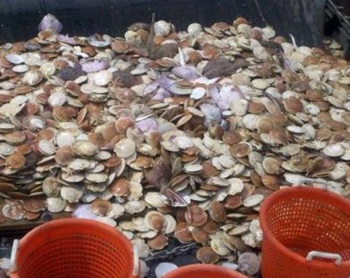 Scallop Framework 39 proposes 2025 fishing year specifications, 2026 default specifications, revisions to seasonal bycatch closures to improve scallop yield, and measures to allow Northern Gulf of Maine (NGOM) permit holders fishing on directed scallop trips in the NGOM Management Area to possess scallops south of 42° 20′. “The New England Fishery Management Council took final action on Framework Adjustment 39 to the Atlantic Sea Scallop Fishery Management Plan when it met December 3-5, 2024 in Newport, Rhode Island. The framework contains specifications and measures to guide the 2025 scallop fishing year, which begins on April 1. The action also includes default measures for fishing year 2026. The framework must be reviewed, approved, and implemented by NOAA Fisheries before taking effect. Here are the Council’s recommended measures: charts, graphs, more, >>CLICK TO READ<< 10:49
Scallop Framework 39 proposes 2025 fishing year specifications, 2026 default specifications, revisions to seasonal bycatch closures to improve scallop yield, and measures to allow Northern Gulf of Maine (NGOM) permit holders fishing on directed scallop trips in the NGOM Management Area to possess scallops south of 42° 20′. “The New England Fishery Management Council took final action on Framework Adjustment 39 to the Atlantic Sea Scallop Fishery Management Plan when it met December 3-5, 2024 in Newport, Rhode Island. The framework contains specifications and measures to guide the 2025 scallop fishing year, which begins on April 1. The action also includes default measures for fishing year 2026. The framework must be reviewed, approved, and implemented by NOAA Fisheries before taking effect. Here are the Council’s recommended measures: charts, graphs, more, >>CLICK TO READ<< 10:49
Bam! Scientists study wind farm construction noise impacts on lobsters… by making big noises
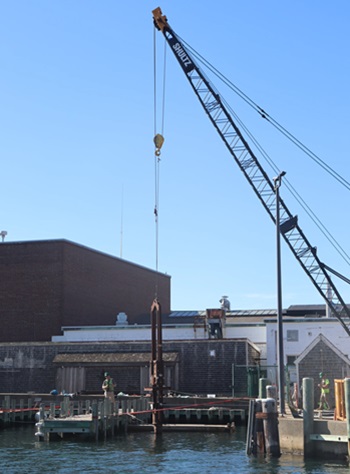 Thirteen feet below the surface of Woods Hole harbor, a lobster shelters under a plastic shield in a wire cage. An experiment is happening: every seven seconds on the dock above, a pile driver pounds a long, steel post deeper into the muddy harbor bottom nearby. The experiment happening here at this dock is designed to replicate, at small scale, the pile driving necessary to construct an offshore wind farm. The goal is to understand how a variety of marine creatures, not only lobsters, but other fish-market-friendly species like scallops, flounder, black sea bass, and squid respond to the noisy, intensive work of building an offshore wind farm. It’s something fishers and regulators are especially interested in. Already, the WHOI team’s earlier studies have shown that squid, which detect sound through vibration, responded dramatically to pile-driving noise — at least, at first. But it’s a different story for scallops, one of the highest value fisheries in the U.S. As soon as scallops were exposed to pile driving noise, they clammed up. Photos, more, >>CLICK TO READ<< 07:59
Thirteen feet below the surface of Woods Hole harbor, a lobster shelters under a plastic shield in a wire cage. An experiment is happening: every seven seconds on the dock above, a pile driver pounds a long, steel post deeper into the muddy harbor bottom nearby. The experiment happening here at this dock is designed to replicate, at small scale, the pile driving necessary to construct an offshore wind farm. The goal is to understand how a variety of marine creatures, not only lobsters, but other fish-market-friendly species like scallops, flounder, black sea bass, and squid respond to the noisy, intensive work of building an offshore wind farm. It’s something fishers and regulators are especially interested in. Already, the WHOI team’s earlier studies have shown that squid, which detect sound through vibration, responded dramatically to pile-driving noise — at least, at first. But it’s a different story for scallops, one of the highest value fisheries in the U.S. As soon as scallops were exposed to pile driving noise, they clammed up. Photos, more, >>CLICK TO READ<< 07:59
2024-2025 Scallop Season – Online Materials are Available
 The DMR Advisory Council has reviewed and approved the proposed rulemaking for Chapter 11 Scallops, setting the 2024-2025 season. This notice is to inform harvesters that scallop season materials are now available on the DMR website under “Information for the 2024-2025 Scallop Season” and to also provide a summary of changes for the upcoming 2024-2025 season. As a reminder for all zones, scallop harvest begins 1/2 hour before sunrise. Scallop fishery requires electronic reporting of day trips, submitted weekly by Sunday 11:59 p.m. information, links, more, >>CLICK TO READ<< 12:33
The DMR Advisory Council has reviewed and approved the proposed rulemaking for Chapter 11 Scallops, setting the 2024-2025 season. This notice is to inform harvesters that scallop season materials are now available on the DMR website under “Information for the 2024-2025 Scallop Season” and to also provide a summary of changes for the upcoming 2024-2025 season. As a reminder for all zones, scallop harvest begins 1/2 hour before sunrise. Scallop fishery requires electronic reporting of day trips, submitted weekly by Sunday 11:59 p.m. information, links, more, >>CLICK TO READ<< 12:33
Nantucket Commercial Scalloping Season Opens; Fisherman Getting $12 Per Pound
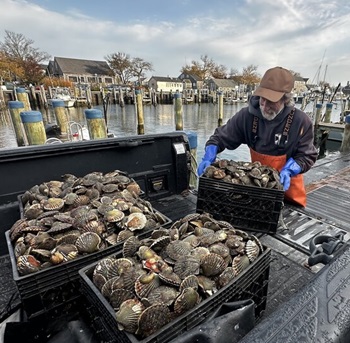 Nantucket’s commercial scalloping season opened Friday morning with roughly 20 boats returning to the water as temperatures hovered in the 60s. But how was the scalloping itself on opening day? Naturally, it depends on who you ask. “It wasn’t that great,” said Marty Mack as he was unloading his catch at Straight Wharf. “I thought it would be a lot better because of the seed we had last year. I’ve seen a lot worse. But I’ve seen a lot better. It’s below average I’d say, I’ve been doing it 41 years and it’s nothing great right now. Where’d all that seed go? I don’t know if some of it died.” Kona Hosier and Ron Janes were getting back to the Boat Basin with their limit around the same time. “I’d say it was great,” Hosier said. “The efforts that were put forth (referring to the seed), we’re reaping the benefits now.” Photos, more, >>CLICK TO READ<< 06:49
Nantucket’s commercial scalloping season opened Friday morning with roughly 20 boats returning to the water as temperatures hovered in the 60s. But how was the scalloping itself on opening day? Naturally, it depends on who you ask. “It wasn’t that great,” said Marty Mack as he was unloading his catch at Straight Wharf. “I thought it would be a lot better because of the seed we had last year. I’ve seen a lot worse. But I’ve seen a lot better. It’s below average I’d say, I’ve been doing it 41 years and it’s nothing great right now. Where’d all that seed go? I don’t know if some of it died.” Kona Hosier and Ron Janes were getting back to the Boat Basin with their limit around the same time. “I’d say it was great,” Hosier said. “The efforts that were put forth (referring to the seed), we’re reaping the benefits now.” Photos, more, >>CLICK TO READ<< 06:49
2024 Maine Scallop License Lottery Winners Announced
 The Maine Department of Marine Resources (DMR) has announced the latest winners of the state’s scallop license lotteries. Each winner is responsible for applying for a license within 30 days of notification. The new licenses are the result of a limited entry system established by the legislature and implemented through regulation in June 2018 that allows someone who did not hold a scallop license in the previous year to be eligible for one. This year there were 74 entries for dive licenses and 1,095 entries for drag licenses. With $35 of each lottery entry fee deposited into DMR’s Scallop Research Fund, a total of $40,915 was raised to support scallop research and management. The winners include the following. more, >>CLICK TO READ<< 09:24
The Maine Department of Marine Resources (DMR) has announced the latest winners of the state’s scallop license lotteries. Each winner is responsible for applying for a license within 30 days of notification. The new licenses are the result of a limited entry system established by the legislature and implemented through regulation in June 2018 that allows someone who did not hold a scallop license in the previous year to be eligible for one. This year there were 74 entries for dive licenses and 1,095 entries for drag licenses. With $35 of each lottery entry fee deposited into DMR’s Scallop Research Fund, a total of $40,915 was raised to support scallop research and management. The winners include the following. more, >>CLICK TO READ<< 09:24
Ferrante urges state officials to ‘step up’ advocacy for fishing
 As the Beacon Hill political crowd munched on ceviches and chowders in the Great Hall on Wednesday, they heard a message from the seafood industry aimed more at Washington, D.C., than the halls of the State House. Rep. Ann-Margaret Ferrante, the daughter of a fisherman and a 30-year advocate for the fishing industry, spoke at the annual Seafood Day in the state capitol about “what the federal government does to us.” The Gloucester Democrat found fault with how the feds survey fishery resources and shrink local fishing quotas, saying that the industry will perish unless a new course is charted. She wasn’t alone: Roger Berkowitz, formerly of Legal Sea Foods, told the crowd about NOAA’s past use of “boats with broken gear” to formulate their stock assessments. more, >>CLICK TO READ<< 08:30
As the Beacon Hill political crowd munched on ceviches and chowders in the Great Hall on Wednesday, they heard a message from the seafood industry aimed more at Washington, D.C., than the halls of the State House. Rep. Ann-Margaret Ferrante, the daughter of a fisherman and a 30-year advocate for the fishing industry, spoke at the annual Seafood Day in the state capitol about “what the federal government does to us.” The Gloucester Democrat found fault with how the feds survey fishery resources and shrink local fishing quotas, saying that the industry will perish unless a new course is charted. She wasn’t alone: Roger Berkowitz, formerly of Legal Sea Foods, told the crowd about NOAA’s past use of “boats with broken gear” to formulate their stock assessments. more, >>CLICK TO READ<< 08:30
Is New Bedford the top commercial fishing port in the United States?
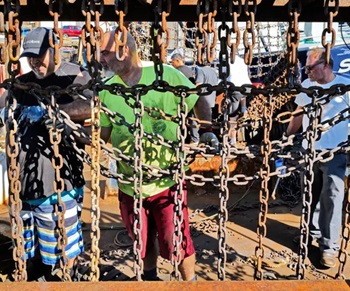 New Bedford takes great pride in its port, and its scallopers account for a significant portion of its value. It’s proven that the Port of New Bedford has great value. New Bedford still ranks as the top commercial fishing port by value as recently as 2022, according to figures released by the National Marine Fisheries Service, Oceanic and Atmospheric Administration, known as NOAA Fisheries. New Bedford had landed $443.2 million worth of seafood in 2022, again placing it at the top of NOAA Fisheries’ revenue list. That’s thanks in large part to all the scalloper landings in New Bedford contributing to the port’s value. Scallop landings accounted for 84 percent of the value. more, >>CLICK TO READ<< 06:22
New Bedford takes great pride in its port, and its scallopers account for a significant portion of its value. It’s proven that the Port of New Bedford has great value. New Bedford still ranks as the top commercial fishing port by value as recently as 2022, according to figures released by the National Marine Fisheries Service, Oceanic and Atmospheric Administration, known as NOAA Fisheries. New Bedford had landed $443.2 million worth of seafood in 2022, again placing it at the top of NOAA Fisheries’ revenue list. That’s thanks in large part to all the scalloper landings in New Bedford contributing to the port’s value. Scallop landings accounted for 84 percent of the value. more, >>CLICK TO READ<< 06:22
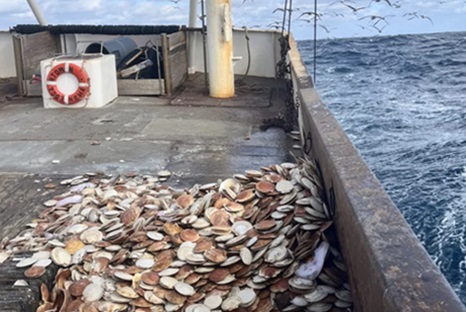
Scallopers assail continued closure of Northern Edge
Fisheries regulators voted this month to “discontinue” development of a plan to reopen the Northern Edge of Georges Bank — a lucrative scallop ground that has long been closed to commercial fishing. In April, the New England Fishery Management Council agreed to consider requests to reopen the fishing grounds at the urging of both the scallop industry and Mayor Jon Mitchell. He and industry representatives cited significant headwinds for the region’s top fishery, including a slump in prices and fewer days at sea for fishermen. They added that opening the Northern Edge would benefit the whole port economy and surrounding businesses. But in the midst of a four-day meeting in Freeport, Maine, the Council voted not to continue discussing plans to reopen the area in order to focus on the “long-term productivity of the Georges Bank scallop resource.” For regulators, it’s a balancing act to weigh sustainability and the economic pressures on fishermen to sustain their livelihoods. more, >>CLICK TO READ<< 17:43
Fishery council considering Mayor Mitchell’s plea to open Northern Edge to scallopers
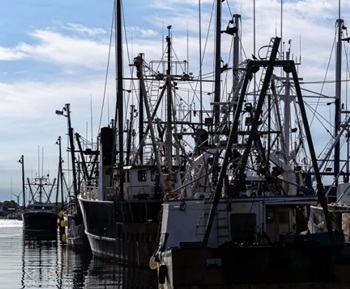 On Tuesday, Mitchell delivered testimony to the New England Fishery Management Council (NEFMC). He cited challenging years ahead for the scallop industry, which is being strained by a slump in prices and fewer days at sea for fishermen; and he stressed the importance of the scallop fishery as a foundational part of the port’s economy. “The industry would benefit greatly by adding these areas to its available fishing grounds.” The region under consideration is the northernmost portion of the broad and productive fishing grounds called Georges Bank. In 1994, the Northern Edge was closed to commercial fishing to protect habitat for spawning cod and other bottom dwelling fisheries. Thirty years later, scallop representatives told the council, groundfish populations like cod have continued to decline while the area has remained locked up to scallopers. more, >>CLICK TO READ<< 06:14
On Tuesday, Mitchell delivered testimony to the New England Fishery Management Council (NEFMC). He cited challenging years ahead for the scallop industry, which is being strained by a slump in prices and fewer days at sea for fishermen; and he stressed the importance of the scallop fishery as a foundational part of the port’s economy. “The industry would benefit greatly by adding these areas to its available fishing grounds.” The region under consideration is the northernmost portion of the broad and productive fishing grounds called Georges Bank. In 1994, the Northern Edge was closed to commercial fishing to protect habitat for spawning cod and other bottom dwelling fisheries. Thirty years later, scallop representatives told the council, groundfish populations like cod have continued to decline while the area has remained locked up to scallopers. more, >>CLICK TO READ<< 06:14
Mayor Mitchell advocates for scallopers
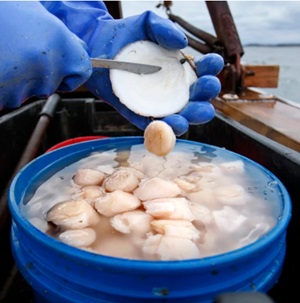 Mayor Jon Mitchell is advocating for the New England Fishery Management Council to open the Northern edge scallop grounds to New Bedford commercial fishermen. In a letter to Chairman of the Board, Eric Reid, Mitchell said that making these areas available would benefit the industry greatly and create a “key new source of scallops.” “While there are multiple species that are harvested by New Bedford fishing vessels, scallops are the prime drivers of economic activity within the Port of New Bedford,” Mitchell wrote. more, >>CLICK TO READ<< 12:54
Mayor Jon Mitchell is advocating for the New England Fishery Management Council to open the Northern edge scallop grounds to New Bedford commercial fishermen. In a letter to Chairman of the Board, Eric Reid, Mitchell said that making these areas available would benefit the industry greatly and create a “key new source of scallops.” “While there are multiple species that are harvested by New Bedford fishing vessels, scallops are the prime drivers of economic activity within the Port of New Bedford,” Mitchell wrote. more, >>CLICK TO READ<< 12:54
Scallop wallop – Japanese imports are taking a bite out of New Bedford’s lucrative seafood industry at a time when the region’s shellfish are in shorter supply.
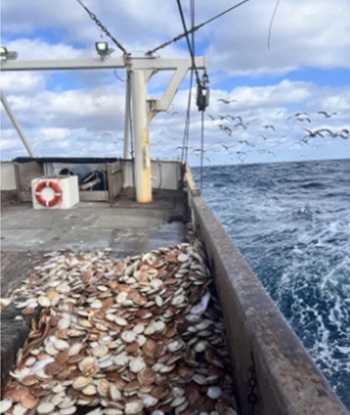 Rahm Emanuel, the U.S. ambassador to Japan, landed a deal to supply U.S. military bases in Japan with scallops and other Japanese seafood products. Japan is an ally, he said, and it is important to support one of their major industries in a challenging moment. “In America we have a saying about being a good neighbor,” Emanuel said, according to the military news service Stars and Stripes. “This is being a good neighbor.” The recent spike in Japanese scallop imports is a complex political tangle. But in the U.S. seafood trade, distributors aren’t buying Japanese scallops to be neighborly, as Emanuel put it. “It’s business,” said Drew Minkiewicz, a D.C. attorney who represents commercial fishing and shipping interests. “Japan’s government is making a targeted effort to push as many scallops as they can into the U.S. That competes directly with our scallops here.” more, >>click to read<< 12:36
Rahm Emanuel, the U.S. ambassador to Japan, landed a deal to supply U.S. military bases in Japan with scallops and other Japanese seafood products. Japan is an ally, he said, and it is important to support one of their major industries in a challenging moment. “In America we have a saying about being a good neighbor,” Emanuel said, according to the military news service Stars and Stripes. “This is being a good neighbor.” The recent spike in Japanese scallop imports is a complex political tangle. But in the U.S. seafood trade, distributors aren’t buying Japanese scallops to be neighborly, as Emanuel put it. “It’s business,” said Drew Minkiewicz, a D.C. attorney who represents commercial fishing and shipping interests. “Japan’s government is making a targeted effort to push as many scallops as they can into the U.S. That competes directly with our scallops here.” more, >>click to read<< 12:36
Ocean Choice sells Nova Scotia offshore scallop quota
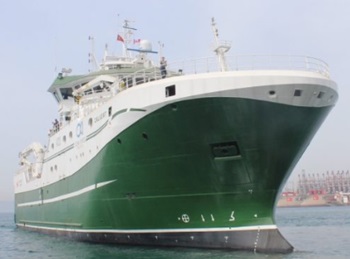 Ocean Choice International has sold its offshore Nova Scotia scallop quotas to three Nova Scotia companies with a long history harvesting sea scallops off the coast of Nova Scotia – Mersey Seafoods Limited, LaHave Seafoods Limited and Comeau’s Sea Foods Limited. ‘We are committed to sustainably growing our place in the fishery in Newfoundland and Labrador; and this decision supports our investment and growth in our business and the fishing industry here at home,’ said Ocean Choice CEO Martin Sullivan. As part of the agreement, Ocean Choice is also acquiring Newfoundland and Labrador offshore quota for Greenland halibut and northern cod from Mersey, and Greenland halibut, northern cod and redfish from LaHave, further strengthening the company’s Newfoundland- and Labrador-based business. more, >>click to read<< 10:21
Ocean Choice International has sold its offshore Nova Scotia scallop quotas to three Nova Scotia companies with a long history harvesting sea scallops off the coast of Nova Scotia – Mersey Seafoods Limited, LaHave Seafoods Limited and Comeau’s Sea Foods Limited. ‘We are committed to sustainably growing our place in the fishery in Newfoundland and Labrador; and this decision supports our investment and growth in our business and the fishing industry here at home,’ said Ocean Choice CEO Martin Sullivan. As part of the agreement, Ocean Choice is also acquiring Newfoundland and Labrador offshore quota for Greenland halibut and northern cod from Mersey, and Greenland halibut, northern cod and redfish from LaHave, further strengthening the company’s Newfoundland- and Labrador-based business. more, >>click to read<< 10:21
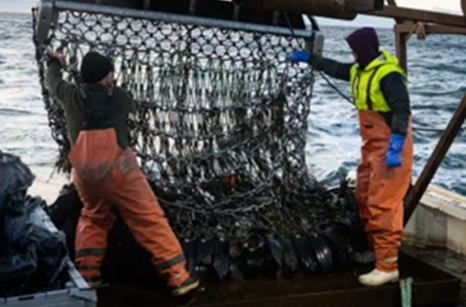
A day on the ocean with Maine’s tough winter scallopers
Their day began in the 5:30 a.m. darkness, when Josh Todd and his father, Alex Todd, steamed the F/V Jacob & Joshua from Chebeague Island to Littlejohn Island, where they picked up Blanchard. As Alex Todd piloted his boat to the day’s fishing ground west of Eagle Island, Josh Todd and Blanchard readied the vessel’s eight-foot, 1,500-pound dredge where it hung from scaffolding at the stern. Once in position, Blanchard lowered the dredge on a quarter-inch steel cable. The Jacob & Joshua shuddered, and the rigging groaned, as the dredge bit into the graveled sea floor, roughly 80 feet below. 8 photos, more, >>click to read<< 08:15
Canadian scallop quota valued at $200M sells to 3 Nova Scotia companies
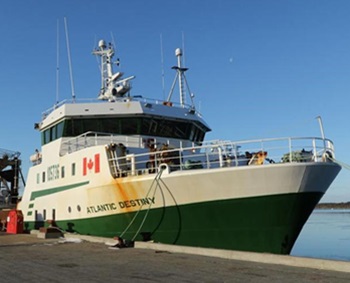 In a blockbuster seafood deal, St. John’s-based Ocean Choice International (OCI) has sold its Canadian offshore scallop quota, worth an estimated $200 million, to three Nova Scotia companies. Ocean Choice held 16.77 per cent of the offshore scallop quota, which is fished mostly on Georges Bank off southern Nova Scotia. A key driver in the sale was the sinking of the company’s factory trawler Atlantic Destiny on Georges Bank in March 2021. CEO Martin Sullivan says they opted not to replace it. “We were looking at our options and we talked to these three Nova Scotia companies that have been industry partners of ours for a long time.” more, >>click to read<< 08:08
In a blockbuster seafood deal, St. John’s-based Ocean Choice International (OCI) has sold its Canadian offshore scallop quota, worth an estimated $200 million, to three Nova Scotia companies. Ocean Choice held 16.77 per cent of the offshore scallop quota, which is fished mostly on Georges Bank off southern Nova Scotia. A key driver in the sale was the sinking of the company’s factory trawler Atlantic Destiny on Georges Bank in March 2021. CEO Martin Sullivan says they opted not to replace it. “We were looking at our options and we talked to these three Nova Scotia companies that have been industry partners of ours for a long time.” more, >>click to read<< 08:08
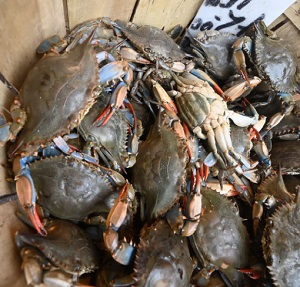
East Hampton fishing for stiffer laws against ‘organized crab crime ring’ stealing bushels of shellfish
Town officials are fishing for even stiffer laws in the war against “organized crab crime rings.” The tougher penalties are needed to turn the tide against “vans full of” out-of-towners bagging “bushels and bushels of shellfish out of Napeague Harbor” and other waterways including Georgica Pond, the town’s attorneys said. “They basically just start taking everything they can grab from the shallows and those two waters: from clams to scallops to conchs, hermit crabs, blue claw crabs. Pretty much grab any size of anything they can in sight,” said Chris Carillo, attorney for the town’s trustees. The night raiders employ a lookout to alert them to Marine Patrol officers and those who are caught don’t carry ID, and because it’s merely a violation, the offenders avoid being fitted for handcuffs, Carillo said. >click to read< 18:41
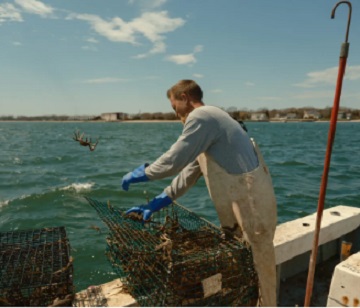
Peconic Bay Scallops are a legacy at risk
For more than 30 years, Tim Sweat has spent the early morning hours of winter on Peconic Bay. By noon on most days, he would collect thousands of pounds of scallops — enough to cover the daily cost of maintaining his boat, plus put aside some extra money for the holidays. But for the last four years, as bay scallops continue to die off at an alarming rate, he’s finished the season with little to show for his efforts. “I’ve spent most of my life out here on the water; fishing is my whole life. But the future is not looking very promising for the smaller boats like me,” Sweat said. “We’re struggling to make a living out here, things keep dying off.” >click to read< 13:33
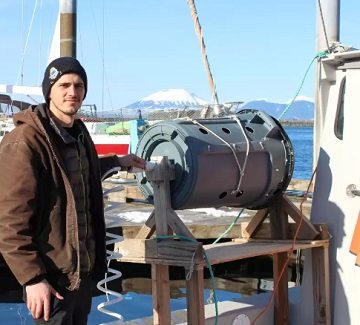
Sitka scallop fishery a test of one entrepreneur’s ingenuity and skill
On days when Evan O’Brien isn’t diving for pink swimming scallops or harvesting gooseneck barnacles off steep rock faces at low tide you can find him in a slip at Thomsen Harbor, working on the new diving boat he purchased from Oxnard, California earlier this year. The F/V Sinbad was purchased by O’Brien for his company, Merrick Shellfish, from a sea urchin diver, so the boat is equipped with everything he needs for a dive. So what does a typical dive for these scallops look like? “You’ll swim up to a boulder or something that’s covered with them,” O’Brien explains. “And in the winter like this, maybe, I don’t know, 10 to 20% of them will take off, start swimming,” he continues. “I just leave those, and I harvest the ones that stay, because they’re kind of dormant and they’re sort of hibernating, so they’re easier to harvest.” Video, >click to read< 16:45
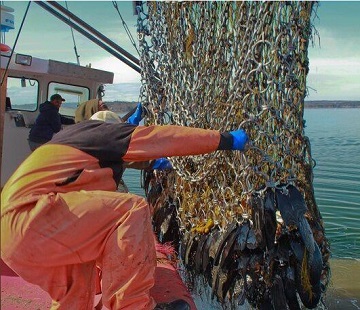
Scallop season winds down
As the state’s commercial scallop season winds to a close, federal regulators on April 1 decreased the amount that draggers can land in 2023 in the Northern Gulf of Maine by 25,000 pounds. Total landings for the NGOM for 2023 are 434,311 pounds, the National Oceanic and Atmospheric Administration (NOAA) announced March 31 as part of its overall NGOM Management Plan for 2023. Vessels are limited to possessing 1,666 pounds of in-shell scallops. NOAA had closed the NGOM scallop fishery on May 26, 2022, when its quota had been landed, effective through March 31 of this year, with Maine and Massachusetts vessels exempted if they were exclusively fishing in state waters. >click to read< 16:28
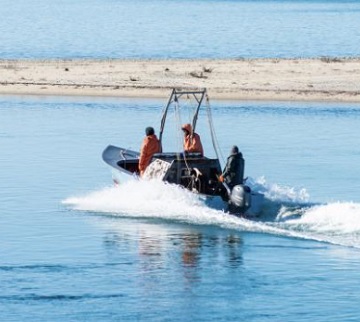
Edgartown Extends Cape Pogue Scallop Season
Following a banner year for Island bay scallops, the town of Edgartown has opted to extend commercial bay scallop season in Cape Pogue an extra two weeks until April 14. “We’re seeing the best bay scallop season we’ve seen in all my and the fishermen’s 25 years’ experience,” shellfish constable Rob Morrison told the select board on Monday. The commercial season for bay scallop fishing typically begins November 1 and ends March 31. Earlier this year, bay scallop fishermen struggled to take advantage of the plentiful yield as scallop prices plunged to almost half their normal rate. >click to read< 10:57
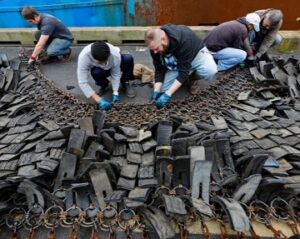
New Bedford mayor calls for closed scallop grounds to reopen to fishermen
“Recent research by Woods Hole Oceanographic Institution and others demonstrates that the Northern Edge can sustain scallop fishing. Given this research, I do not see a pressing need to conduct additional research before opening the Northern Edge,” Mitchell stated in written testimony submitted to the NEFMC. While New Bedford fishing vessels harvest multiple species, he said, “scallops are the prime drivers” of the Port of New Bedford’s economy, the most valuable commercial fishing port in the United States. >click to read< 06:31
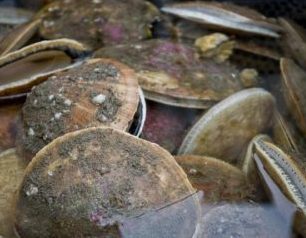
New Research Supports Opening of Currently Closed Scallop Areas
Data presented to the New England Fishery Management Council last month provide the latest evidence that long-closed areas of the Northwest Atlantic can be sustainably opened to the scallop fishery. The Fisheries Survival Fund, which represents the vast majority of full-time Atlantic Sea scallop fishermen, has long believed that these areas can be safely opened, and supports efforts to do so in light of this new evidence. The Northern Edge of Georges Bank (more formally known as Closed Area II Habitat Area of Particular Concern), has been closed to all commercial fishing activity since 1994. >click to read< 10:00
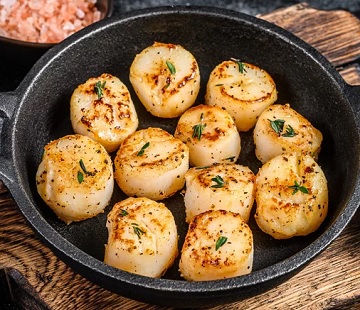
8 Types of Scallops – What to Know About Them and Ways to Cook
While they are no longer regarded as rich man’s food, they are still pretty pricey. And this is primarily due to the supply-and-demand concept. More importantly, they are full of health benefits. As impressive as scallops are, they are a confusing species. From dry versus wet scallops to divers and day boats, there’s a lot to them. We are here to clear the air. This article discusses the common scallop varieties and ways to cook each mollusk. We’ll also discuss how you can store them and how to avoid buying fake scallops. Yes, that’s right: Fake scallops exist. >click to read< 14:32
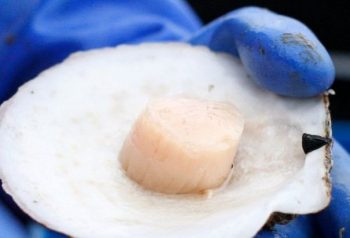
This Maine fishery owner tries to keep an even keel amid volatile scallop prices
High food prices are hurting households and restaurants alike. Grocery prices for meat, poultry, fish and eggs jumped 12.5% over 2021, according to the consumer price index. Restaurants are fighting inflation by getting creative with menus and portion sizes. But how do you run a business that supplies restaurants when your costs change month to month, week to week or even day to day? That’s what Maine’s fishing industry is dealing with. Togue Brawn, a self-proclaimed “Maine scallop evangelist” and owner of Downeast Dayboat fishery in Bath, said prices for the mollusks have been “through the roof” recently. With fishing quotas, a scarcity in scallops and rising inflation across the country, top-quality scallops cost as much as $38 per pound. >click to read< 12:51
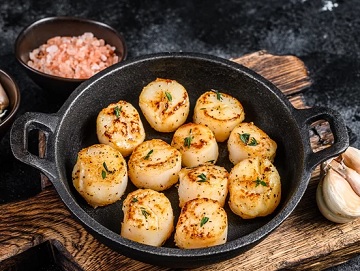
Different Ways to Cook the Perfect Scallops
It’s no surprise that scallops are a favorite of seafood lovers. Tender and slightly sweet, when properly prepared, they’re a culinary marvel. And, with a bit of guidance, you can create restaurant-worthy scallops right at home. Scallops can also be purchased either wet or dry. Opt for dry scallops whenever possible for a better taste and texture. Now that you have some background on which scallops to buy, let’s get cooking! Some excellent recipes for Seared Scallops, Grilled Scallops, Scallops in Cream Sauce, and many more! >click to read< 09:55
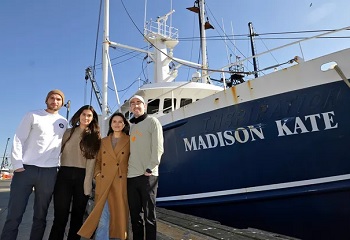
From boat to table: Family starts direct-to-consumer scallop business
At the beginning of the pandemic and over 1,000 miles from New Bedford, Britt St. George and Madison Lees quarantined in Florida with their father, John Lees, founder of Mar-Lees Seafood and current president of New England Marine; their mother; and their significant others, Zack St. George and Edward Smith. It was a time in which scallops were a part of nearly every conversation, Madison Lees said, and not just because their father is in the business. It was because the family business was growing. They also figured it would be the perfect time to sell scallops directly to consumers online as restaurants were either closed or running at limited capacity, he said. “Now or never, now is the time to do it,” >click to read< 07:57
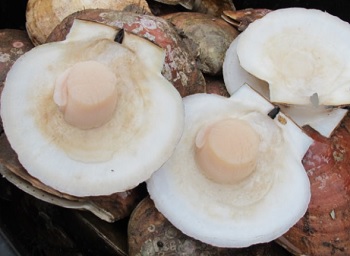
Maine fishing regulators are closing the state’s richest scallop fishing grounds
The state is closing Cobscook, Whiting and Dennys bays for the rest of the fishing season starting Sunday to help conserve the scallop population, the Maine Department of Marine Resources said Friday. Cobscook Bay is home to some of the most productive scallop fishing in the state. Maine is also closing a handful of other scallop fishing areas around the state, including instituting a partial closure of western Casco Bay, >click to read< 13:27

“Seared Diver Scallops”: In these tough economic times, this dive harvester is trying to keep money in the province
Through late summer and early fall, Tim Ball spent as much time as possible underwater in his dive gear, scouring the seabed off the Burin Peninsula for scallops. It’s an ocean-to-table operation that sees his hand-harvested scallops quickly making their way to dinner plates in the downtown of St. 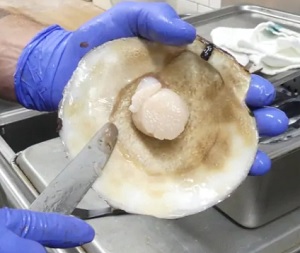 John’s. Terre Restaurant in St. John’s is one of the destinations for Ball’s scallops. For Ball, that means, among other things, using locally made bags and boxes for packing his scallops and using a Burin Peninsula cab company for sending his catch into St. John’s. “They’re amazing,” said head chef Matthew Swift. “Anywhere else in the world … the idea of marketing day boat scallops is sort of a pipe dream. >click to read< 09:04
John’s. Terre Restaurant in St. John’s is one of the destinations for Ball’s scallops. For Ball, that means, among other things, using locally made bags and boxes for packing his scallops and using a Burin Peninsula cab company for sending his catch into St. John’s. “They’re amazing,” said head chef Matthew Swift. “Anywhere else in the world … the idea of marketing day boat scallops is sort of a pipe dream. >click to read< 09:04


































